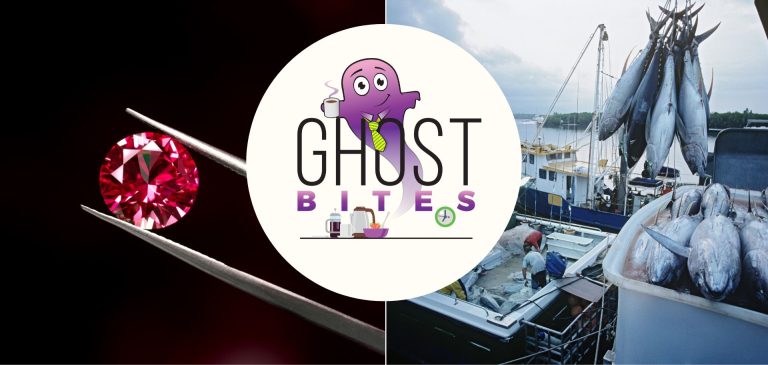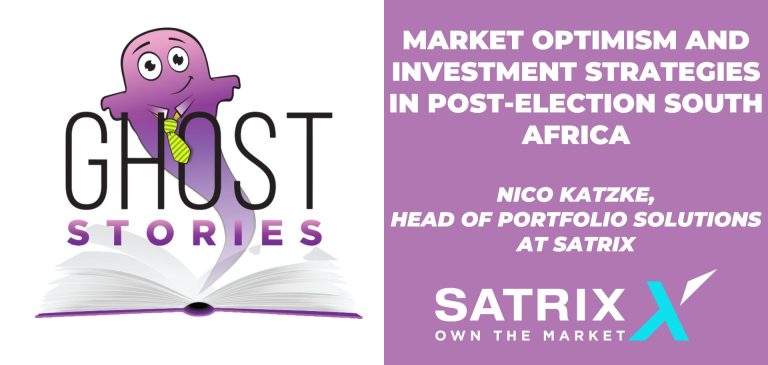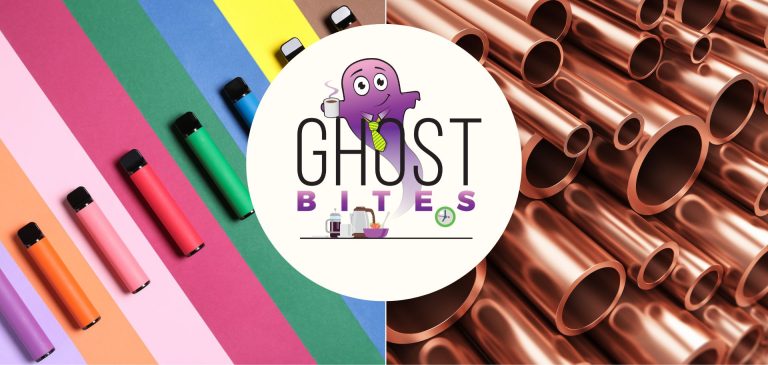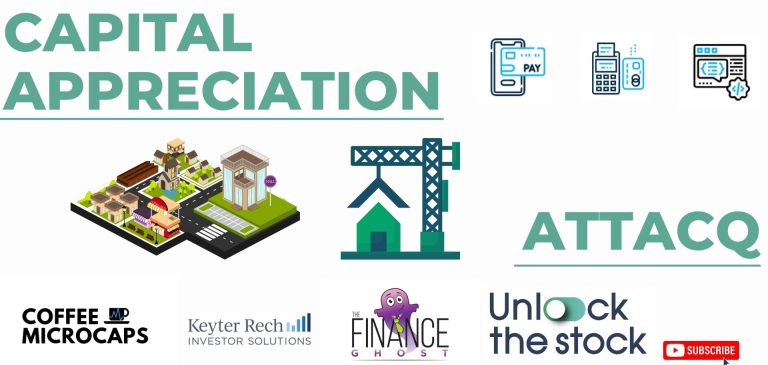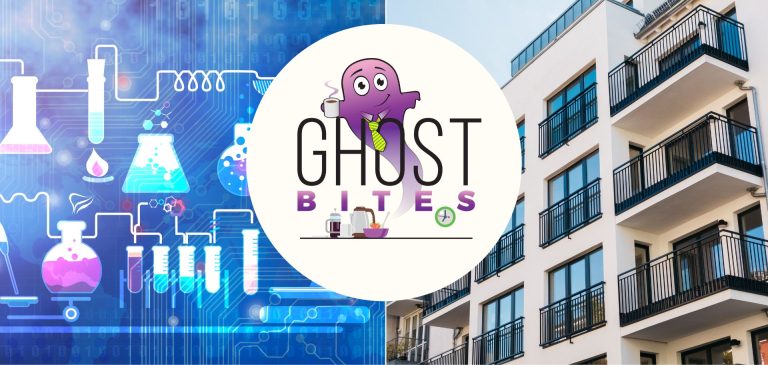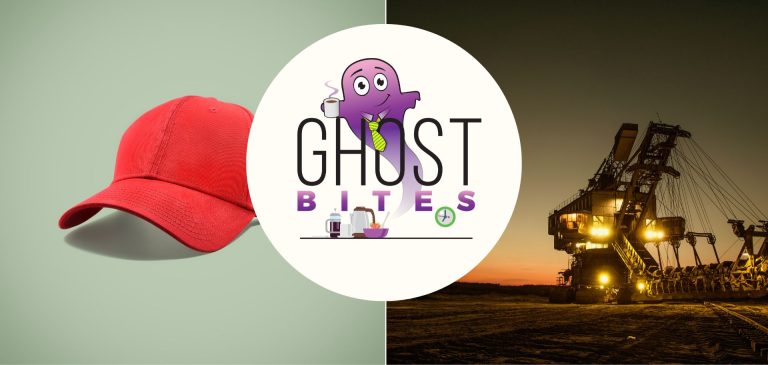Listen to the show using this podcast player:
In this excellent discussion with Nico Katzke, Head of Portfolio Solutions at Satrix Investments, we talked about a range of topics that are of great relevance to South African investors. This included:
- The performance of the local market in the aftermath of the election and why indices behaved differently
- How the carry trade works and why this tends to protect the rand
- The relative appeal of South African equities in this environment
- Property and government bonds as a way to play the local theme
- How ETFs can be used to express these views and build a portfolio
For those willing to put in the effort to expand their investment knowledge and build wealth, this is a fantastic podcast. The full transcript is included below for those who prefer to read. This podcast was first published here.
Full transcript:
Introduction: This episode of Ghost Stories is brought to you by Satrix, the leading provider of index tracking solutions in South Africa and a proud partner of Ghost Mail. With no minimums and easy, low-cost access to local and global products via the SatrixNow online investment platform, everyone can own the market. Visit satrix.co.za for more information.
The Finance Ghost: Welcome to this episode of the Ghost Stories podcast, and this episode features Nico Katzke of Satrix. Nico, we’ve done so many of these. I enjoy every single one with you. We seem to be in a bad habit lately of starting the podcast late, because we just enjoy catching up before we actually hit the record button, about everything from both of us being swept away by the weather, through to a shared enjoyment of poker that we just discovered. We might have to act on that at some point.
But of course, we are here to talk about the markets, which is kind of like poker at scale, because there’s lots of maths, there’s lots of sentiment, there’s lots of understanding what other people might do. I suppose I’m not shocked that we both enjoy poker as well.
Nico Katzke: Absolutely. I’m an equal part a fan of poker and chess.
The Finance Ghost: Yeah, that’s another thing I like, is chess. I used to play a lot of that, and I think it is the same way of thinking, honestly.
Nico Katzke: Yeah, well, chess, a bit less so, because I think the rules of the game are fixed in chess. That’s why you see computer algorithms corner the chess market, where with poker, there’s so many moving parts, and it’s a psychological game.
Investments are a bit more like poker. I think that’s more reflective of the markets, actually. There’s a lot of sentiment driving returns and movement, and it’s not a fixed rule game.
The Finance Ghost: That’s fair enough, actually. There’s a risk element to both. But you’re right, there’s technically a right answer in chess, whereas there isn’t a right answer necessarily in poker, not something that you can train a computer to know for sure is the right answer. Go run all these scenarios and away you go. Yes, that’s a good point, actually. I guess poker is closer to the markets, although it is amazing how many people I know in finance who spent a lot of time in their lives playing chess.
If you ever wanted your kid to get into the markets, you could definitely do worse than put a chessboard in front of them, or perhaps poker cards. But I think one is probably in the parenting handbooks and the other one is something you do a bit skelm and when maybe your spouse is not 100% keeping an eye on what you’re up to.
Nico Katzke: I suppose, I suppose. But the same algorithms that have cornered chess, if you apply them in poker tournaments, they actually end sort of mid-table; they don’t beat seasoned poker players. And I think that that’s the key. Sometimes a suboptimal move is the best move. And, when it comes to – or objectively suboptimal, if you can even define any move in poker as such – and I think that’s part of the market as well. Sometimes you might do something that, in hindsight, probably wasn’t the best move, but it turned out to be okay. Dealing with your decisions just makes life that much easier.
The Finance Ghost: And there’s a lot of luck, and there’s a lot of luck in the markets as well. I mean, this morning in Ghost Mail, I literally wrote about how this rally on the JSE has given Pick n Pay this incredible get-out-of-jail card. Not only have they not had load shedding to deal with for the last three months, but they’ve also now had this market rally as they’re about to do their rights offer.
Look, that makes a bigger difference to Pick n Pay shareholders than it does to the company. The company raises R4 billion regardless. It kind of just hurts shareholders more if the share price is lower. But later this year, they’re planning to unbundle Boxer and sell down a piece of that stake. And obviously you want to be selling an asset into strength, not selling it into weakness. I mean, that’s markets 101, right? You want to sell high. You can’t sell high if sentiment is poor. And of course that’s been the story of the second quarter in South Africa on our market, is sentiment. And it’s all been driven around what’s happened with elections. It’s been quite something to watch.
Nico Katzke: If we take a step back, it’s almost as if the markets had an enormous sigh of collective relief that we had following the election. If you think just two months ago many were predicting the worst possible outcome for markets, of an ANC/EFF alignment that was almost going to materialise. And I think a lot of people, their anxiety became clear and it reflected in the prices of assets. Instead, after the election, we had a splintering off of the least market-friendly and radical elements from the ANC, I suppose, and a merger of parties that are, in my most optimistic take of the situation, at least hoping to steer the country away from further economic erosion.
You don’t want to give credit where credit’s due, but if you want to be overly optimistic, you might say that Cyril has been playing fourth dimensional chess and has seen this well in advance and with the radical elements splintering out of the ANC, you can to some extent argue that some of the more populist elements or hard left-leaning, and some corners corrupt elements of the ANC have splintered off again. What you’re left with is a more centrist, market-friendly, pragmatic ANC that’s willing to negotiate.
What we need as a country and what democracy needs is for there to be a coming together of different views and acceptance of different views. And in order to steer this economy forward, we all need to pull our weight. We can’t be saying one part needs to pull and another part shouldn’t pull or shouldn’t be involved in pulling. I mean, that’s no way of talking about it. And if ever we can get any inspiration, it’s from our rugby team that just everyone pulls in the same direction. The eye on the prize. And once you start unifying things, it’s a powerful force. And that’s why I’m so glad that the new government has unification in its name. And let’s hope – long may it continue.
The Finance Ghost: I love that you raised the Springboks there. Siya’s tackle, which will forever go down now as the cause of us needing visas to go to Ireland. The sort of jokes on Twitter around the rugby are always great. And everyone talks about Rassie playing 4D chess. Maybe President Ramaphosa as well, I don’t know. But either way, I’m happy with the outcome. I’m a dyed-in-the-wool capitalist, and I firmly believe prosperity for everyone comes from markets that are working.
Unfortunately, there’s a lot of populist views otherwise. In my opinion, simple, is you just have to look at the world around you, where are the most prosperous countries, where do the jobs come from, etc. etc. Obviously, we won’t dive too deep into politics on this show. That’s not really the mandate, although it’s hard to resist in an election year, because unfortunately, markets and politics are linked. That’s the reality. And if you don’t believe that, you just need to go and draw a chart of our market and go and compare the first quarter to the second quarter. I looked last night at the Satrix Top 40 ETF, it was up when I looked last night, 7% year-to-date, that’s the return excluding dividends for just over six months. On an annualised basis, which is always a very dangerous thing to do, it looks fine. You would double that more or less, and you get to actually a decent return, certainly a lot better than we see, or that we’ve seen on an average year in the JSE for many years now.
However, the first quarter was flat. The second quarter is where all of the magic happened, and there was this big sentiment uplift. Now obviously investors will look at that and say, well, if you’re not in the market, you can’t get the upswings, you just can’t. If you’re going to sit back and be in cash all the time, then at some point the markets will leave you behind and you’re not going to get these benefits, which is why people advocate for ongoing, steady investing into equities, into ETFs. I’m a big proponent of that.
Obviously this is a Satrix podcast and it sounds like I’m getting paid to say that, but I do this myself. I believe strongly in adding ETFs to your portfolio and doing it on an ongoing basis. At the very least, you should be maxing out your tax-free savings every year into ETFs or you are really not playing 4D chess then, you’re really not even playing 1D chess. Over and above that, traders, I guess, would look at this and say, well, this is the kind of benefit of taking a risk based on events, based on outcomes, based on probabilities, based on looking at a market and saying, well, South Africa was “cheap” – you see people saying that a lot – so have a punt on the outcome. Risk and reward, hey, that’s how this game works. If you’re not prepared to take the risk, you’re not going to bank the returns.
Nico Katzke: Absolutely. And I think to your point, the market is probably still cheap locally. A lot of these companies are trading well below what you would regard as international levels of price earnings or dividend yield multiples. However you look at it, it still arguably remains very cheap. And while there’s been this run in the second quarter, to your point, I think a lot of these asset classes are actually flat if you just look at it on a twelve month basis.
Locally, I think there’s a case to be made that local is again lekker. It’s probably a bit early to tell what the long-term impact of this coalition government will bring to the South African economy and markets.
Particularly if you think about it, oftentimes market participants are only asking for government to reduce bureaucratic barriers and allow the market to actually run. Ultimately, a sustainable economy is one where the government is not creating all the jobs, the market is, and the market wants to create jobs. If you think about the South Africans that are here are passionate about their country, they want to live here. And I think when people want to live in a country, they want to raise their kids in a country, they want to long term be here – that’s when they start to invest in a country.
When there’s uncertainty around the sustainability of our economic policies, government, etcetera, that’s when people start to be hesitant for taking on long-term investment. I’m really hoping that this new government is a step in the right direction. I don’t think it’s going to be the end of our political woes completely. I think this might be a bumpy ride going forward, but at least we’ve left the bus station. At least we’re on a path in most respects. I think most people will agree we’re in a better place now than we were just a few months ago. I think that much is clear. And we’re hoping for more favourable policies towards economic growth, streamlining, for example, of decision-making and delivery of products and services, basic services that we all need for a functioning economy. The financial markets reaction has been favourable to this to date and over the last few months, and we hope that may continue.
If you look at the optimism, to your point, it certainly reflected, if you look at the ETFs, the Satrix FINI ETF, which tracks banks, insurance companies and other financial services providers, that’s done phenomenally well. And you had a day after the election where the banks rallied – what was it – financials rallied 8% in one day.
The Finance Ghost: You’ve stolen my thunder here, Nico. On my other screen here, you’ll never believe it, but I just charted the Satrix FINI because I thought, oh, the Top 40 is maybe not the best indication of SA Inc., because it’s full of rand hedges and it’s full of this stuff. Then I looked at Satrix INDI and I’m like, yeah, maybe. But then I looked at Satrix FINI and I thought, okay, that’s actually the best view on the sentiment trade. And well done to you for completely stealing my thunder. You are a good poker player. I can see it. I can see it.
Nico Katzke: I called your raise and I raised the FINI.
The Finance Ghost: My Satrix ETF raise, yes.
Nico Katzke: But that’s interesting, Ghost, because if you take a step back and ask the question, because I think a lot of casual market participants will look at their Top 40 holding and think, well, why haven’t I seen the bounce in the Top 40 that I’ve experienced in the FINI, as an example. Have I missed the opportunity? Let’s take a step back and unpack that.
If you look at the Top 40 index, there’s a lot of global heavyweights in there. Your Richemonts, your Billitons, your Naspers. These are companies that derive the majority of their earnings from offshore. The strengthening rand, in many respects, is actually not great for their nominal valuations. Think of a Richemont. If you’re selling luxury goods overseas and you’re repatriating dollars and euros and yens and the like back into rand, well, a stronger rand simply means those returns are now against you. What you want with those companies is actually that the rand weakens so that your dollar is worth more in rand terms.
The interesting situation is the Top 40 is much more of a rand hedge, if you compare it to, for example, the FINI, which is a rand play. Let’s think that through. If you look at your financials, your banks, your insurance companies, etcetera, well, they are effectively lending out money in rand. They are being paid back 10, 15, 20 year loans, and they’re getting paid back in rand. If the rand strengthens, then those debt liabilities are worth more today, if you discount that back to today.
For banks, you want the rand to be strong. A weakening currency simply means that the value of your future returns in any neutral currency compared to the dollar or what have you, is always going to be worse off. What’s good for the rand is good for the banks and the industrials and financials and the like. Well, the financials specifically. But you’d also hope longer term for the industrials, too. Definitely, it matters which one you had in your portfolio.
The rising tide lifts all the boats, but in this case, some boats were lifted a bit more.
The Finance Ghost: Yeah, some boats are in the right part of the harbour to get that tide, absolutely. And, of course, the other thing with the banks is credit loss ratios. If the economy is going to do better, then you hopefully will see a better credit performance ultimately, which does wonders for margins. And you also see more activity, you see more non-interest revenue coming through, which is a wonderful boost to return on equity.
You’ve raised that point there on the strengthening rand and the level of rates that the banks can earn. And I think that brings us neatly to this concept of a carry trade, because we have a situation where South Africa is a nice high-yield economy. And it’s been that because people have priced in a significant amount of risk, and why wouldn’t they? If you look at the economic track record over the last ten years, and as much as populist politicians want us to believe otherwise, and like to tell long stories about the markets, very few of which are true, people don’t give you money because they feel sorry for you. They invest in you because they believe you’re going to give them a risk-weighted return. And if you carve out a country that is riskier, your cost of borrowing is going to go up, and your ability to invest in your people in South Africa is diminished. Your ability to do infrastructure, your ability to service debt, all of this stuff.
This is the uncomfortable truth that populist politicians don’t want you to understand, and certainly aren’t going to explain nicely, but that carry trade is an important point to understand, because from a bank perspective, that’s part of it, really. They’re earning great rates on what is now seen as a more stable economy. The banks are then worth more than they were a few months ago. Theoretically, the rand is now offering a great yield on what people believe is maybe a more stable economy. Is this the kind of stuff that leads to us eventually being able to do rate cuts, maybe even beyond what is happening in the Fed? If our risk weighting comes down, can we cut deeper and then stimulate growth accordingly?
Nico Katzke: There’s two interesting elements that you raised there. The first is the carry trade phenomenon. The second one is what might likely happen to rates toward the end of the year. I think let’s first talk about the carry trade. And it’s such an important feature. We did some research a number of years back, following Nenegate, and the puzzle at the time was clearly our government was in a shambles. They was a grab for public resources and sustainability of our political sphere, at the time, was very dubious. There should have been a lot of strong alarm bells.
And to your point, no one is nice out there. If foreigners see the investment case for South Africa not being there, they’re just going to extract their money. At the time, the rand weakened a bit, but not to the extent that you would expect if an emerging market, another emerging market, were to fire their finance minister, install someone, and then the Monday again fire and bring in someone else. I mean, that level of shambles in managing the public purse should have sent the rand into a deep spiral. The question that we asked after the fact was, why didn’t the rand blow out far more?
If you look at other emerging market economies, all our peers on the global stage, some of them have far larger economies. Think of your Brazils, your Argentinas, your Turkeys. I mean, their currencies blow out a lot. And we complain when the rand goes from R17 to the dollar to R19 to the dollar, and we all feel so much poorer, so much worse off about life in general. But have you ever seen the rand go from R17 to R50 to the dollar? You don’t see those type of blowouts. And the question is why? Why don’t we see these extreme currency fluctuations? I know the rand is volatile, absolutely, but the level of swings is actually comparatively muted if you look at some of our emerging market peers. And what we found is that a large part of this is actually due to this carry trade that is implicitly happening in the market, that’s not always easy to see explicitly, the level of this. It’s not sort of reported by Bloomberg, you can see the level of carry, but you can imply it, and you can see how there is a lot of flows happening.
So let me take a step back and explain what the carry trade is. To give your listeners a sense of why I remain optimistic that the rand will not blow out to R25, R30 to the dollar. And I’ve been saying this for years.
You can think of carry trade very crudely as using cheap money to buy higher-yielding money. Okay, so basically what this means is that investors take advantage of interest rate differences between countries by borrowing money where rates are low, like, for example, the US or Japan, and then investing the borrowed money in countries where interest rates are high. If you take, for example, an investor that is able to borrow money in the US, where the current ten year-bond yield is at, what’s it, 4.3%, and then use that money to buy ten-year SA bonds that yield above 10%, so you’re borrowing at 4, call it 5%; you’re borrowing at 5% and you’re buying at 10%, or you’re earning 10%. That 5% interest differential is in your favour.
Now, of course, there’s no free lunch, right? And this strategy’s success is definitely dependent on an investor’s time horizon and entry and exit points. Of course, this is a very active trade, and it’s a risky trade, but it’s a potentially very profitable trade. Now, this trade of borrowing in US and investing in local or SA yields that are 5% higher, this trade only makes sense if the rand does not weaken by more than the 5% interest difference.
If it weakens more – let’s say the rand weakens by 12% – that means, yes, you’re earning that 5% yield difference, but you’re getting back rands that are now 12% weaker. Then you lose 7% on your investment. If you can time it well to actually enter this trade, and if the rand stays more or less flat or even strengthens, that will all go into your favour. Now, the fascinating thing is that the attractive carry prospect is such an important feature for our local currency, and one that I would argue likely has saved us in the past from larger blowouts that are typical of other EM currencies. Now, the reason why South Africa or the rand, is so well positioned for taking advantage of this when the rand weakens – the reason for this is that we have a very deep and liquid bond market, which means investors can easily access and offload these instruments.
If you’re able to invest in South African bonds, but you’re equally able to tomorrow sell it, if the rand, for example, goes against you, well, that means you are more willing to enter into a carry trade. Years ago, Turkey just simply banned or imposed capital control. You weren’t able to expatriate your lira-earning debt instruments back into your original currency, which meant you had to sit through the currency weakening. If you’re not able to offload those instruments or access it easily, well, you’re not going to enter into a risky carry trade.
Part of why we have such a deep, liquid and trusted bond market, as an example, is because we have strong and credible central bank and financial institutions that exude confidence in the market, and that the more radical forces that oftentimes speak in the political spheres have not been able to capture those institutions. The market believes that. The market trusts that. The combination of all of what I’m saying, maybe if you re-listen to that and just think about this interesting phenomenon, a very important feature at the centre of all of that, or the correcting feature that you have, is if the rand were to weaken tomorrow – let’s say it goes from R18 to the dollar to R21 – market participants look at that and they say, you know what? The odds of the rand weakening further has now greatly been reduced. This carry trade is becoming more attractive because the rand will likely go back to call it R19, R18 levels.
What happens then is when the rand starts to weaken, it moves outside of that bound, you start to see market entrants buying up rands, buying these instruments to make that carry trade possible, which then pushes the rand back into that R18, R19 level. You have this almost natural correcting force from the carry trade investors that actually just push the rand back into a more “realistic” level, if you like. That’s a very important feature of our local currency, is that it is so liquid and so easily tradable, and our bond instruments are credible that this actually supports the currency to the point where you don’t see wild swings. And I’d argue we should defend those critical institutions because that certainly defends the currency.
The Finance Ghost: Absolutely. We’ve covered equities, we’ve covered the rand. That pretty much covers it off in terms of the big stuff from a South African perspective. And I would encourage people to actually go have a look at that Satrix government bond ETF that I’ve done a couple of shows ago with Siya. Go and draw that chart. That’s STX GOV, pretty interesting. Obviously, that’s rallied beautifully as well now with the improved sentiments. There are many ways to play this game, ultimately.
But the one thing that is still in the back of the mind of the bears among us, really, is there was great excitement once upon a time when a gentleman named President Cyril Ramaphosa went and had a walk on the Sea Point promenade and there was mass celebration, and everyone thought this was wonderful. And then we went into a very tough period. And yes, Covid did not help anyone, so bank that. We’re not exactly a super tech-focused economy. It’s not like we got the upswing of cloud computing. We really didn’t. All we did was get absolutely smashed by the downward move in tourism. Over that time you didn’t want to be a tourism economy, you wanted to be a tech economy. And we’re not one of those. Fair enough, but either way, I think we can all agree that it was a very disappointing few years economically. I guess we just have to hope that doesn’t happen again, right, otherwise, so many of these positive swings we’ve seen, they’re vulnerable. They’re vulnerable to bad news. And I think if we start to see any kind of just reversion to populist politics or just non-market friendly policies of any kind, I guess this unwinds very quickly, right? That’s the risk.
Nico Katzke: Absolutely. So you can, if you’re pessimistic, you can argue that, the Ramaphoria has given way to GNU-phoria, which is now all the rage. The market is loving this. Certainly there’s a renewed optimism around South Africa’s future and you might look back and say, well, we had that euphoria when President Cyril Ramaphosa walked on the promenade. But the reality, I think, and why I’m more optimistic this round, is that a lot of those bad elements from government have been removed. And this is why I say that if you don’t want to give credit where it’s not due, but in truth, when Cyril Ramaphosa took over the government or took over the presidency back then, you had a lot of those bad elements still firmly entrenched in the governing party.
It’s almost like fourth-dimensional chess. Those bad elements have arguably splintered off into other factions and have now left the chat, if you like. What’s left is parties that are wanting to negotiate, parties that are wanting to find common ground and move forward. Hopefully, this round, the presidency will see the opportunity and seize the opportunity to actually take this optimistic view to their advantage. Because the optimism we had then was off an extremely low base. And you can hopefully, I think, comfortably say that we’ve reached rock bottom in the past few years and we are on an upward trajectory. It’s very hard for me to imagine how we turn back from here into the levels of poor service delivery and government, the very poor radical machinations. But you know what I mean, it’s very hard to actually reverse those gains I think we’ve made in terms of optimism in recent two months, I’d say, post-election, and long may that continue.
Look, and I think we all just want a better economy. We all just want to move in a positive direction, create jobs, because government can’t create jobs indefinitely. It can’t be the main source of job creation. It has to come from the public. And the public is wanting to pick up the pieces and put back together, I think a fantastic economy. We have great companies, we have world-leading companies in many respects. Hopefully they get the opportunity now to actually not be pulled back by bureaucracy and the red tape we’ve seen in the past, but actually just look to the future and flourish. That would absolutely be my hope. And so let’s hope this GNU-phoria may continue. Optimism is a powerful, powerful thing.
The Finance Ghost: Okay, so before we end off the podcast, I just have to temper all the South African enthusiasm with a year-to-date chart that includes the S&P500 and the Nasdaq 100. Now, obviously, timing is important, and we can debate all day long about what will the next five years look like, how expensive are the markets, etcetera, etcetera, etcetera. But I think we can also agree it’s been a strong year so far for South African equities, or rather a strong quarter, really. Now, admittedly, I was comparing here to the Satrix 40, which is maybe not the best comparison as we’ve discussed, but for a lot of South Africans looking for just broad market exposure, that’s the button they hit. Correctly or incorrectly, they hit Satrix 40. Now, the Satrix 40 as of last night was up 7% year-to-date. S&P500 – so I’ve done the feeder fund, the Satrix feeder fund, so these are all Satrix products you can go and invest in right now – so this takes the S&P500 return, and it turns it into rands. So we are comparing apples with apples here because we’re comparing to the Satrix 40 in rands. The S&P500 year-to-date, 16%. And then the Nasdaq 100, obviously powered by all of the stuff around AI and Nvidia and blah, blah, blah, all of the tech stuff, up 21% so far this year.
Interestingly enough, despite all of the sentiment and everything else, if you’d come into this year and you said, okay, I’m going to have a punt at my local market index, I think we’re going to have a great year. Yes, you’d be doing pretty well year-to-date. If you annualize the Satrix 40 return, it looks good. But then you look at the overseas stuff and you’ve got to just remind yourself, we can all get very excited about the Springboks and everything else, but we are not sitting in an economy that is changing the world right now. Unfortunately, we’re just not. And there’s something to be said for diversification and making sure a portion of your money is sitting in those tech companies that will change the way we live for the next 20 years. We’ve got some great companies in South Africa, but not many of them are going to change the world over the next decade.
Nico Katzke: I can’t agree more. And if you look at the performance of those global indices, a large part of that is due to tech really coming to the fore and markets pricing it as here to stay. And like we’ve said on previous discussions, you’re in the infrastructure development phase. There’s a lot still that needs to happen in terms of investing and spending before we actually see broad market application.
Watch this space. I think your large companies, potentially a lot more runway to actually improve earnings going forward, even off the current high base. Something to maybe consider as well and curb our enthusiasm is if you look at the ten-year bond yield today, it’s still higher locally than it was at the beginning of the year. Yes, there’s been optimism, but that was, like I mentioned, off a very low base, almost off a default assumption that the worst possible outcome will happen in the election. Yes, there’s been sort of almost a euphoric signal from the market. But clearly the market is not saying we are completely out of the woods yet. This might be a good opportunity to look longer term and reason for yourself whether you think we’re taking a step in the right direction because it’s not completely priced in yet.
I think the market is cautiously optimistic on South Africa. It might also be a great opportunity where the rand is a bit stronger, perhaps currently than it was a month or two ago, to get some of that offshore exposure with the rand being a bit stronger and build that exposure. For me, that is absolutely a dollar averaging exercise. Investing in MSCI World or S&P500 or Nasdaq, you shouldn’t be wanting to time it, because these are volatile indices, make no mistake.
You want to average your entry, let’s say you want to invest R100,000 into S&P500. Instead of doing it one shot, pressing the button, maybe stagger that investment in over 12 months, 24 months. That’s what I mean by dollar averaging, and build that exposure so that you build that exposure through the market cycle. That’s always the ideal when it comes to investing long term, is building exposure, not timing it, not sort of jumping in when you think that the timing is right.
But yeah, absolutely building that exposure. Another asset class you haven’t mentioned is the SA listed property index, which is up handsomely year-to-date, I think just, just more than 10%.
The Finance Ghost: My personal little favourite for a GNU dawn with a G, actually. Yes, it’s an interesting one. It’s something we discussed on Magic Markets recently as well. I think that’s not a bad place to play what’s happening in South Africa. I really do, especially in a tax-free savings account. Get the yield tax-free on these REITs.
Nico Katzke: That’s a very high duration call if you like, if you want to make a comparison to bonds or very high beta SA Inc. play. Either way you cut it, the local property market probably stands to benefit the most from a more stabilised government, improved public services delivery, with rates coming down perhaps towards the end of the year. If you look at the STeFI currently, versus on a three-year basis or rolling three-year and a rolling twelve-month basis compared to the same for inflation, you are starting to see that real yields are picking up. This is creating room for the central bank certainly to start cutting rates from a real yield perspective.
That’s breaching the 2% longer-term real yield level again on a rolling basis. We prefer to look at those things on a rolling basis. You don’t want to look at it just at a snapshot, but you want to sort of look at that trend. And certainly there is, you can almost safely say definitely more runway for the central banks to start cutting rates locally, but we’ll probably take our cue from the Fed there. I’d be very surprised if we start to move out of lockstep with global central banks. It’s always possible, but I wouldn’t think we would be too enthusiastic about doing that. But in all likelihood, it seems like the Fed will start cutting rates at some stage this year. And once that starts to happen again and yields start to go down, that’s just great for property again, and it’s going to be great for financials as well, and all those companies that stand to benefit from your discounting rate going down.
Because as we’ve said on this podcast before, you and I have discussed this, if you look at interest rates long term, especially the sort of ten year plus interest rates, they’re a great proxy for what the market uses to discount future earnings back to today’s levels. When interest rates go down, that simply means you’re discounting at a lower rate. That’s good for properties from that perspective, because those indebted vehicles that use debt to acquire property, now that debt is looking far more manageable. You’re discounting future earnings to today at a better rate, at a lower rate. In your price, that’s being reflected as well. Looking ahead, I’m very cautiously optimistic. You don’t want to peg your hopes on uncertain outcomes but like in poker, you have to play the hand that’s dealt. And I think currently we’re sitting with a good hand compared to a few months ago. I’m looking forward to playing this hand and seeing how this plays out. Cautiously optimistic, the table is turning.
The Finance Ghost: Nico, I’ll end off by saying, on the interest rates, on the banks, I guess you got to be careful that as rates come down, their net interest margin normally contracts as well. They benefit from the valuation curve effectively, but they actually generally suffer a bit of a knock to their earnings. And that’s why I like the property companies so much, because not only do they benefit from the valuation curve, but their expenses go down because they are the most highly geared assets in the world, right. You’re sitting with, typically a 40%, 50% – oh, that’s a bit high – like 40% loan to value and that money is going to the banks. That’s my favourite play.
But I think where I want to end off is to actually say this is where ETFs are just so interesting. These thematic instruments that are low cost, easy in and out, highly liquid, available in your tax-free savings account and let you express a view on the markets. All kinds of interesting views. Don’t make the mistake of thinking ETFs are some boring, Top 40 debit order only – that stuff’s important. But you can do so much more with them as well. You can go and take a view on property for this year or whatever the case may be. And that’s certainly my favourite thing about the ETFs. And Satrix has such a wide range of them, so go and check them out. And Nico, thank you as always for your time. It’s been another great discussion. The time goes so fast and I just always enjoy having these chats with you.
Nico Katzke: Absolutely. And I think, maybe just one last point on the banks, that margin point you make is absolutely valid, but there comes a point where its actually hurting you because your creditors are really struggling to make their payments. And what you see is in an economy where interest rates are very high, especially real yields are very high, you do see a lot of people renege on their ability to make those payments. That’s also when banks start to get in trouble, is where a lot of these loans become bad loans. Hopefully with interest rates coming down, they are able to still preserve a healthy margin, that’s certainly still there, but at least your consumers are able to make good on their mortgages and the like.
I think that would be good for the banks as well. And certainly a more stable economic outlook will be good for banks. But I like the way you ended it. Absolutely. ETFs are a great way to buy diversified exposure. Buying single stocks, it’s great fun and it’s a great way to learn.
But ultimately, when you’re building long-term market exposure, you also need to have that stable, income-generating asset that is well-diversified, low cost, and delivers over a 5, 10 year period. I think that’s where ETFs are really great vehicle.
Thanks for your time and thanks for your great show again. Keep the good content in the morning coming through.
The Finance Ghost: Thank you Nico. I appreciate it. We’ll do this again. Ciao.
Nico Katzke: Cheers.
Satrix Investments Pty Limited and Satrix Managers RF Pty Limited are authorised financial services providers. Nothing you have heard in this podcast should be construed as advice. Please do your own research and visit the Satrix website for more information on all their ETF products.


